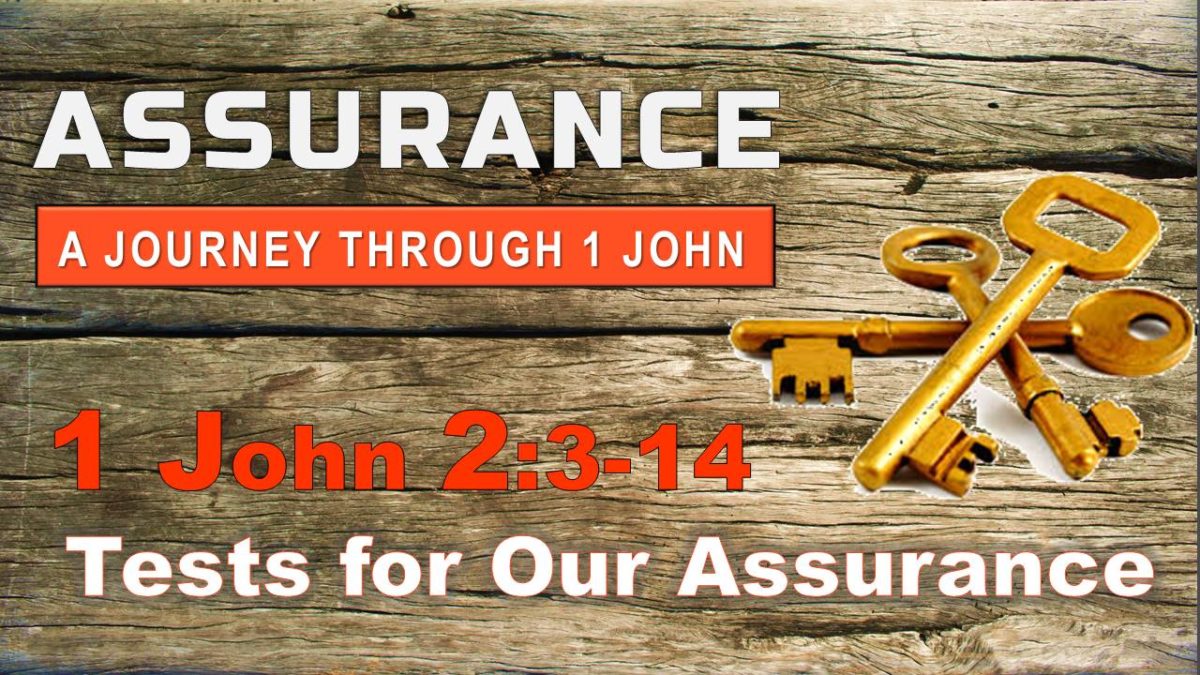How many of us would consider ourselves fathers or mothers in Jesus? How about young men or women? Or children?
In 1 John 2.3-14 we see that assurance in the faith grows when we obey God and love others. And, just like we grow in our faith in Jesus, it’s God’s plan that we’d grow in the assurance that we belong to God.
That’s why old Apostle John writes his first epistle to the churches under his care, and why he gives them (and us) tests to help us measure our growth in the faith. These tests (repeated in three cycles) make up the structure of John’s letter. We consider the first two tests in the first cycle today.
Test of Obedience (2.3-6). And by this we know that we have come to know him, if we keep his commandments (:3). John bases this first test of assurance on our habitual and continual desire for the things of God. Notice, he’s not basing our assurance on some experience in the past, or even our testimony including what we say, but on our watchfulness and observance of what God has said.
And here we’re thankful for Jesus, again, since Jesus didn’t recite all 600-some Old Testament commands and tell us to follow them. Instead, Jesus kept the law of God perfectly and then summarized the ruling principle of God’s Law into one command. In John 13.34, Jesus says: A new commandment I give to you, that you love one another: just as I have loved you, you also are to love one another. By this all people will know that you are my disciples, if you have love for one another.
That’s Jesus’ command that gives root to every one of our acts of obedience in service to God and others. And it leads to the second test.
Test of Love (2.7-11). This command is both “old” and “new”. It’s old in that it doesn’t add anything to what John has already taught his churches. It’s new in that it’s about Jesus who, in Himself by the Jewish and Old Testament way of reckoning things, divides the “present age” from the “age to come”. The darkness is passing away, because Jesus has been on the scene. Those who love, in Jesus, grow in assurance because they pass the test of belonging to God.
But here we have a practical problem. If you were to ask those on the street whether they love people, I’ll bet about 99% would “say” that they do. But, this test doesn’t measure what we “say”; it measures what we do, remember?
Have you ever known an emotionally wounded person? Maybe, you are that person. Certainly I’ve been wounded in seasons. It’s possible, when we’re hurting, to view all of life through our roundedness. You know how it works. Somebody hurts us; then we interpret every action after that through the original events, till, finally, we … do not know where we are going, because the darkness has blinded his [our] eyes. The Test of Love allows those who have been wounded to hold themselves up to God’s character and ask God for help when they hurt. The hurt is real. Justice needs to be done, maybe. But, our responses can still be loving when we’re hurting. Healing doesn’t come right away, but we can grow through seasons of woundedness, and eventually healing comes because the true light is shining.
Application on Growth and Spiritual Maturity (:12-14). The third test waits while John provides a digression on the church. He speaks to “children,” “fathers” [and mothers] and “young men” [and women]. These refer to levels of maturity. Important is that each has achieved victory and is presently enjoying the result of victory. The perfect tense verbs (somewhat obscured in most English translations) talk about you “having been forgiven,” “having known him who was from the beginning,” “having overcome the evil one”. Past action with present results. As John Stott writes in his commentary, “John is laying emphasis on the assured standing into which every Christian has come, whatever his age of spiritual development”.
So, test yourself this week, why don’t you. Ask yourself if you’re obeying God, thinking especially of Jesus’ command to love others. The purpose of John’s tests is not to grow doubt (unless you don’t believe in Jesus’ work) but assurance. Throw yourself on Jesus’ God-the-Father-satisfying work yet again (2.2). And then, abide in God. Let Him grow you in assurance that you belong to Him. And know that this assurance is rooted in the person and work of Jesus.
Here’s some questions to consider:
What about John’s teaching in this section do you find challenging to understand?
What about John’s teaching do you find difficult to apply? Like the Law of Love, it seems simple and straightforward, until we think of ways we become confused, right?
How have you grown in your assurance, since you first believed in Jesus?
What level of assurance that you belong to God would you like to arrive at? What’s keeping you from going there?

